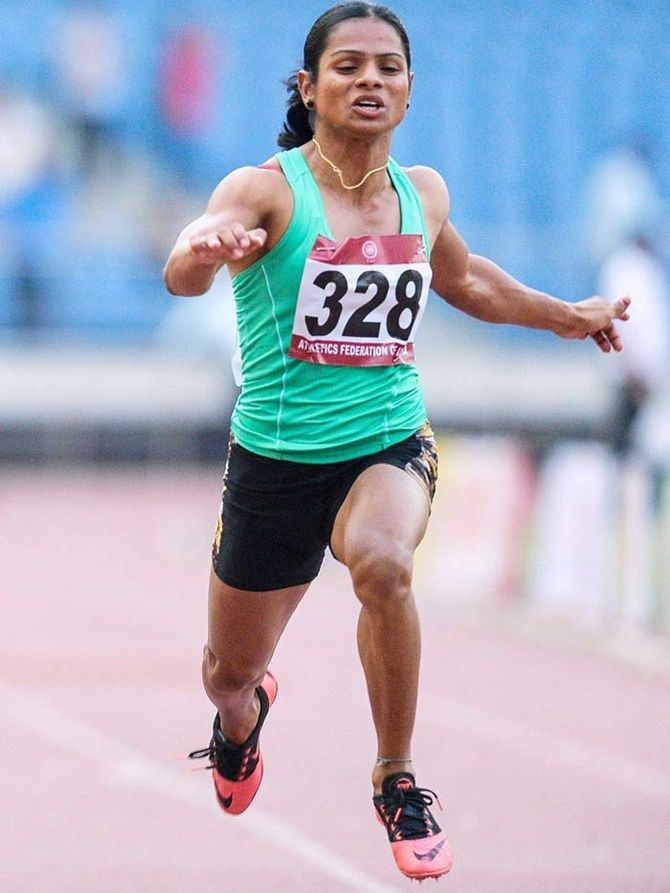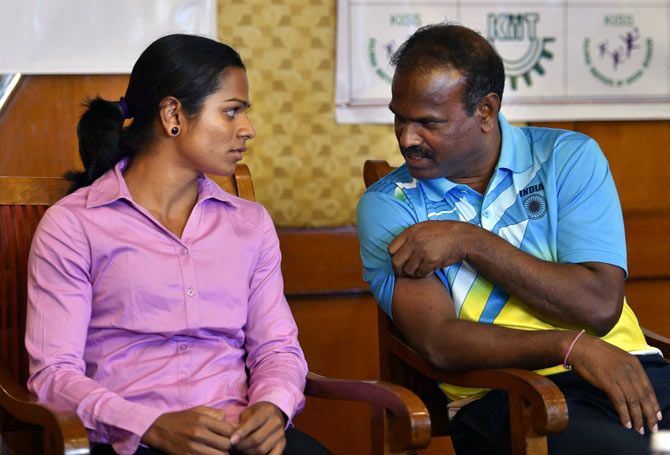Behind sprinter Dutee Chand's rise is a hidden journey filled with pain and hardship, say Nirmalya Behera and Dasarath Reddy.

In some ways, Caster Semenya and Dutee Chand are two sides of the same athletic coin. In 2009, the rangy South African -- then just 18 -- won the women's 800m at the World Championships in Berlin by clocking the fastest time of the year. That same week, Usain Bolt set the world into a stupefying tizzy by obliterating two world records. The event in the German capital, however, belonged to Semenya.
Just days later, Semenya was forced to undergo a gender test after authorities expressed doubts over the tremendous improvement she had made in her running time during the course of the year.
Four years later, far away from the imperialness of Berlin's Olympiastadion, Dutee Chand, an unknown 17 year old from Jajpur in Odisha, became national champion in the 100m and 200m. Diminutive and sprightly, here was Indian sprinting's big hope. A few months later, she was dropped from the Indian contingent on the eve of the 2014 Commonwealth Games for hyperandrogenism.
Now, both Semenya and Chand are going to the Olympic Games in Rio de Janeiro.
The day Chand's qualification was confirmed, several international publications reserved generous space for Chand's exploits. Her uncomfortable tryst with a gender controversy had catapulted her into the back pages of foreign newspapers, but the fact that this was a triumphant journey back from potential oblivion wasn't lost on anyone. Semenya was relegated to easily missable, tiny filler spaces. And she was a world champion once.
In 2012, at a camp in Patiala, N Ramesh spotted the girl with an attitude so assiduous that she was ready to take on pretty much anyone. "She has got this strong, never-give-up attitude. She's all fired up when she's on the track. She doesn't care if the girl running next to her is a world champion," says Ramesh.
Chand secured a Rio berth for the 100m but missed out on the 200m. Despite the mixed results, Ramesh sounds ecstatic. "It's all her doing. I'm glad her hard work has paid off," he says.
In tiny Gopalpur, a village located on the banks of the Brahmani river in Odisha's Jajpur district -- about 80 km from Bhubaneswar -- Chand's achievements on the track are overwhelmingly lauded.
Elder sister Saraswati, a former athlete herself, helped shape Chand's career. "People knew us since I was an athlete too. But now, even people living several kilometres away know our address," says Saraswati, with a grin.
But before all the adulation, was unbearable hardship.
If necessity is the mother of invention, then Chand's life story bears testimony to the adage. The household had little money and Chand's parents had a large family to feed. Chakradhar, Chand's father, was forced to buy grocery on credit. The shopkeeper in the village, in fact, made Chakradhar serve other customers before handing him the items.
But as is often the case in this part of the world, the answer here too lay in athletics. "We figured on the BPL (Below Poverty List). Bagging a government job through the sports quota seemed like the only logical option," says Saraswati, who is the eldest of six children.
Soon, Sarawati started training along the banks of the Brahmani, with her little sister in tow. "She used to run behind me and I saw that she had the potential. She could really run," she recalls. Saraswati is now a sub-inspector in the state police.
Chakradhar points out that he never stopped Saraswati and her sister from practising even though villagers were not happy about it. 'We defied the villagers' suggestion to engage both of them in weaving -- the family occupation. But I had a lot of faith in Dutee," he says.
Just when things were starting to look up for the Chands, the hyperandrogenism controversy in 2014 came as a rude shock. The Athletic Federation of India ban made Chand ineligible to compete as a female athlete.
Saraswati described those days as traumatic. The Chands had never even heard of hyperandrogenism, and so damaging was the verdict that members of the family did not step out of the house for weeks. "I used to console Dutee by saying that even Lord Rama, who was to be coronated, had to live in exile. I tried to make sure that she remained hopeful that the good days will eventually arrive," says Saraswati.

The challenge back then, adds Ramesh, was to keep her ready and motivated for the future, given all the complex legal proceedings that were involved.
Around the same time, former badminton player Pullela Gopichand took Chand under his aegis. The former All England champion readily agreed to provide accommodation and access to the facilities at his academy in Gachibowli in Hyderabad. Gopichand later trained her at the Balayogi Stadium, a stone's throw away from his academy.
According to Ramesh, the training, the quality of food, and the accommodation at the Gopichand Academy all contributed to her journey to Rio. "It was amazing how much it helped her. She became a much better sprinter. I'm grateful to Gopichand for trusting my judgement."
In July 2015, the Court of Arbitration for Sport issued a decision to suspend the hyperandrogenism regulation for female track and field sports for two years, stating that insufficient evidence had been produced to indicate that there is any link between enhanced androgen levels and improved athletic performance.
Jajpur, once the capital of the Kailnga kingdom, is a historic place of pilgrimage. In the Chand family too, religion runs deep. On the day of an event where Chand is due to compete, one earthen lamp each is lit before the images of Lord Hanuman, Maa Tarini and Lord Jagannath.
"I fast every time she participates in an event and pray for her success. I take one meal -- without garlic and onion -- in the day, and that too after the event gets over. I used to do the same for Saraswati," says Akhaji, Chand's mother.
Friends that she went to school with are optimistic about her chances in Rio. "During her school days, she used to bag prizes that were mostly in the form of study materials like pens, copies, etcetera. This time she'squo;ll win gold in Rio," says Utkal Guin, her batchmate at school.
Others such as villager Bipin Bihari Guin are planning to felicitate her in a big way when she comes back. "Her hard work has paid rich dividends. More kids in the village are now motivated to take up athletics."
Her coach, however, offers a more guarded response about Chand's chances in Brazil. "If she can clock 11.20 seconds or under, it will be a decent performance. She can reach the semi-final with that, and that is no mean feat for a first-timer," says Ramesh.
How is the family contributing in their daughter's pursuit of history? "We will break another 108 coconuts at Maa Tarini temple. We gave a similar offering at the temple just before her qualification for the Olympics," Chand's mother says with a smile.













 © 2025
© 2025